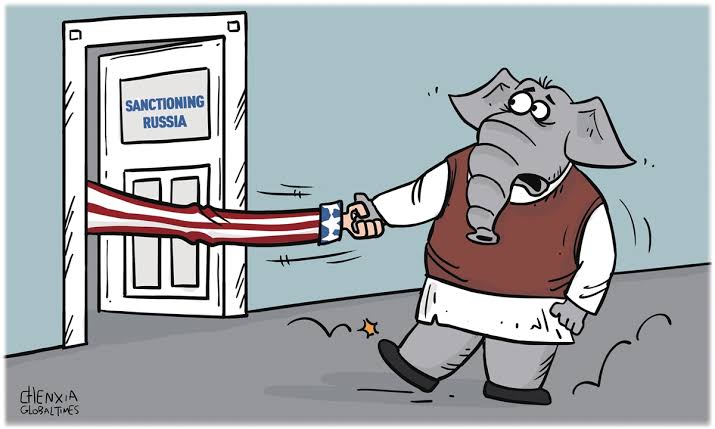Unheeded US warning toward India highlights antipathy of non-Western countries

The US warned India once again. White House top economic adviser Brian Deese claimed on Wednesday that the consequences of New Delhi’s “more explicit strategic alignment” with Moscow would be “significant and long-term.”
Though he knows that USA can do nothing about it. They had sanctioned India in the aftermath of Nuclear tests in 1998, what did they achieve?
So Such tendency of issuing “ Fatwah ” is just akin to a bullying manner! Where the bulky just gets ignored or rebuffed. There is a say I g on this in India too……when elephant walks through the markets, thousands of dogs start barking.
So this kind of an open threat by the US toward India on the latter’s own business exposes the American hollowbess. When it comes to the Ukraine crisis, the US is blatantly displaying its hegemonic mentality – either you are with the US, or against the US. This echoes exactly the same slogan of George W. Bush, made in the wake of the 9/11 attacks.
The US is again telling the world: As a superpower, it has the right to define who you are.
Even if India has not “aligned” with Russia, and has kept a relatively balanced position during the Russia-Ukraine conflict, the US does not buy it. Remaining neutral makes no sense to the US. What Washington wants from New Delhi is completely standing by the side of the US.
Though it makes no difference to India.
The US is afraid that ties among China, Russia and India may further develop due to the Ukraine crisis, although systematic cooperation of the three countries is not rare.
Moreover, the US expects that everything goes well in terms of the Quad summit, which is schedule to be held in Japan, tentatively by the end of June. Yet, if India does not make a statement in line with the US expectation, the summit may hardly take place. Constant warnings over “consequences” against India emerged from the US, revealing Washington’s anxiety.
Before Deese’s remarks, the US has already warned India more than once against constructing alternate payment mechanisms with Russia or buying more oil from Russia. Yet the threats turned out to be in vain, as India benefits from its ties with Russia, which can’t be substituted by the US.
Also, India’s response mirrors an increasingly obvious trend – the US has underestimated the antipathy the rest of the world holds for it. Not only India, but the majority of the general public in China and Latin American countries and other developing world have not taken sides with the US in the Russia-Ukraine conflict, even if the US believes it is standing on the moral high ground. They do not support sanctioning Russia. As Gérard Araud, former French ambassador to the US, put it, even if they don’t particularly like Russia, a lot of non-Westerners are supporting it only because they are confronting with the West.
Quite a few smaller countries have long been bullied by the US. They have long developed a rebellious psychology. This time, the more sanctions Washington imposes on Russia due to the conflict, the more aversion the US will have to face.
The US has long believed it masters superior strength, values, and civilization, which in turn has given birth to its overbearing arrogance. As a result, when interacting with non-Western countries, the US either coerces them or issues warnings to them. Since Washington is accustomed to dealing with others from a position of strength, its relations with other countries have never been on an equal footing.
That’s why the world has been witnessing the US talking about the so-called democracy while it makes dictatorial orders toward other countries.
The resentment from non-Western countries toward such hegemonic arrogance has long been lurking. It is now surfacing during the ongoing Ukraine crisis, along with the real status of the US in international society – It has imposed sanctions on Russia yet has failed to reach expected effects; It claims to be on the justified side, but most countries believe it is the US-led NATO that has turned Ukraine into a pawn, threw it under the bus, and worse, attempted to prolong the war; It pushed India, one of its closest partners, to take sides, but only gained India’s cold shoulder.
Since the outbreak of the conflict, Indian people seem to have been fed up with the US putting pressure on or threatening India. Many of them asked: What kind of a partner is this? India’s balanced diplomacy is thus warmly welcomed by the Indian public. This is a sign of their repugnance toward Washington.
Today, the US would be self-defeating if it stubbornly believes that whoever it cozies up to would feel honored and dance to its tune.
Source: Global Times




